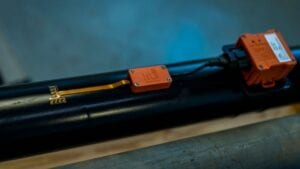Advanced sensors are crucial to any predictive maintenance strategy, and often these sensors must be quickly installed into difficult-to-reach spaces. A novel nanomaterial technology enables predictive sensors that can be “printed” onto flexible stickers. These stickers can be easily attached to rotating or static equipment, including pumps, valves and pipelines. Developed by startup company Feelit (Haifa, Israel; http://feelit.tech), RetroFeel nano-ink sensors can measure process parameters in real time, including strain, temperature, humidity, vibration and pressure, providing remote sensing and critical alerts related to structural or operational anomalies. According to Feelit, the sensors and associated wireless-edge platform create a high-resolution “electric skin” for equipment, boasting a sensitivity that is reportedly 50 times greater than current sensing technologies on the market. The ability to simply glue the sensors to equipment enables a quicker, non-invasive startup without the need to halt production.

Henkel is investing in Feelit’s unique sensor technology (Source: Henkel)
The Adhesive Technologies business of Henkel AG & Co. KGaA (Düsseldorf, Germany; www.henkel.com) recently announced its investment in Feelit’s technology, and last year, the company collaborated with Merck KGaA (Darmstadt, Germany; www.merckgroup.com) for the first production test runs of the sensors. At a Merck production site, Feelit’s sensors were installed on a diaphragm valve to predict diaphragm failure and prevent rupture and loss of chemical containment. Two pilot trials were completed with Feelit’s sensors, and additional trials have been underway at other global manufacturing sites. The partnership with Henkel has expanded the sensors’ reach for new monitoring applications in the oil-and-gas sector, says Feelit CEO Gady Konvalina. Feelit plans to significantly scale up its nanoprinting and sensor-fabrication capacities by 2024.